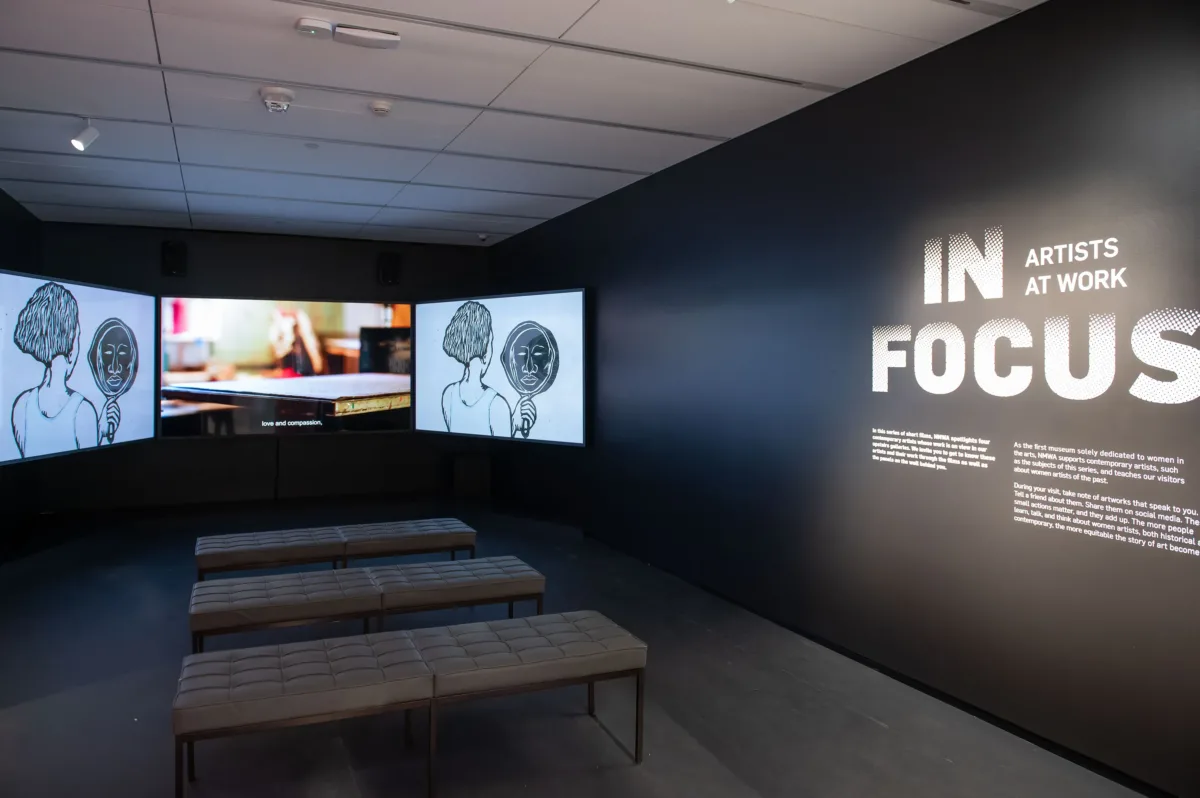Artists at Work Video Series: Graciela Iturbide
English Transcript
( music )
[Graciela] I am Graciela Iturbide.
Photographer.
Mexican.
My work is generally centered on the Indigenous peoples of Mexico, but I now travel all over the world taking photographs.
I go out in the street with my camera, and whatever makes me go, “Ay!” that makes my mind react, and my heart react, that’s what I’ll take a photograph of.
I don’t know if it’s poetic, I don’t know if it’s anthropological, or if it’s just a testimony.
I don’t think about that when I’m photographing. It’s about what surprises me in life.
( music )
I’m going to take a photo. Let’s put you among the plants over here. Perfect.
I prefer photographing in black and white, because when you shoot in black and white, you abstract something from reality. Which for me, is more interesting and complex, and it puts your imagination to work on other things.
So in my mind, I’m always thinking in black and white.
I love the ritual of looking through my contact sheets because that’s when I get to see and remember what I photographed.
First, I take a look at the composition. Then, I make sure the subject looks good.
Sometimes I’ll find really interesting things and sometimes not.
When I go photograph Indigenous communities, I have to seek complicity.
For example, “Nuestra Señora de las Iguanas,”
I was surprised by this woman, and I said, “Hey! Please wait!” because it was just marvelous. And I photographed her.
It’s a photograph that wants to fly on its own and has made its way through the world. Just like “Mujer Ángel,” it’s the only photo of mine that I like because it was a gift from the desert.
I don’t remember taking it.
That was a gift from life that I received through my camera as has happened on many occasions.
( music )
I want to tell you something; my photography is very selfish.
My photography is for me, above all.
Of course, I am a political woman; I am a feminist woman. When I take a photograph, all of these things already live inside me, and my positive influences will appear in that photo. But I never think about how others will see it.
It’s the element of surprise that fills me with pleasure, and I do it because I love it.
( music )
Spanish Transcript
( música )
[Graciela] Soy Graciela Iturbide.
Fotógrafa.
Mexicana.
Mi trabajo, generalmente ha tenido que ver con los pueblos originarios de México, pero ahora viajo por todo el mundo y tomo fotografías.
Yo salgo a la calle con mi cámara y lo que yo vea de “Ay”, de que mi mente reacciona, mi corazón reacciona, yo tomo la fotografía.
No sé si es poético, no sé si es antropológico, si es solamente un testimonio.
Yo no pienso en eso cuando estoy fotografiando, es lo que me sorprende de la vida.
( música )
Te voy a tomar una foto y te tomo una entre las plantas. Yo de este lado. Perfecto.
Prefiero tomar blanco y negro porque cuando tomas en blanco y negro, tú abstraes de la realidad algo donde para mí es más interesante y más complejo y tu imaginación trabaja y se imagina otras cosas.
Yo ya en mi cabeza pienso en blanco y negro.
Me encanta el ritual de ver mis contactos, porque ahí estoy viendo y recordando lo que yo tomé.
Primero me fijo en la composición, después que me haya salido bien la persona.
A veces me salen cosas muy interesantes, a veces no.
Yo cuando voy a tomar fotografías a los pueblos originarios, tengo que tener complicidad.
Y por ejemplo, “Nuestra Señora de las Iguanas”.
Yo me sorprendí con esta mujer y le dije “Ey, por favor, espérese”, porque era maravilloso y le tomé fotos.
Es una foto que quiere volar sola y que ya está por todas partes del mundo, igual que “Mujer Ángel”. Es la única foto mía que me gusta, porque me la regaló el desierto.
Yo no me acuerdo de haberla tomado.
Fue un regalo que me dio la vida a través de mi cámara, como me la ha dado en muchas ocasiones.
( música )
Yo te quiero decir una cosa, mi fotografía es muy egoísta.
Mi fotografía es para mí, primero que nada.
Por supuesto que soy una mujer politizada, soy una mujer feminista. A la hora que yo tomo una foto, todo esto ya está impregnado de mi y mis influencias positivas van a salir en esa foto. Pero, nunca pienso en que lo van a ver.
Es esta sorpresa que me llena de placer y que lo hago porque me encanta.
( música )
In Focus: Artists at Work

